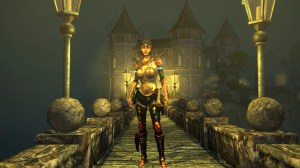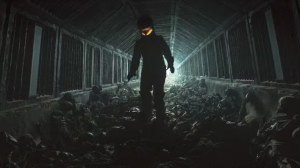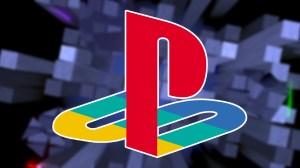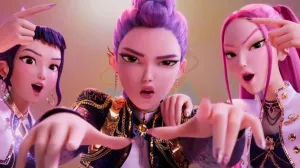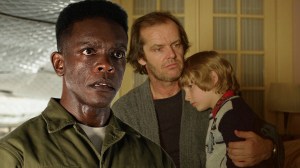Thanks to earlier efforts like Faults and The Art of Self-Defense, filmmaker Riley Stearns has established a unique cinematic niche for himself, as he manages to deliver experiences that are just absurd enough to elevate audiences from their own reality, without sacrificing the grounded themes he explores. Stearns continues to explore this blend of surrealism and dark comedy with the upcoming Dual, which enlisted stars like Guardians of the Galaxy‘s Karen Gillan and Breaking Bad‘s Aaron Paul, challenging them to maintain believability in a high-concept narrative whose literal ambition reflects much deeper emotional themes. Dual lands in theaters on April 15th.
Videos by ComicBook.com
In the film, “Upon receiving a terminal diagnosis, Sarah opts for a cloning procedure to ease her loss on her friends and family. When she makes a sudden and miraculous recovery, her attempts to have her clone decommissioned fail and lead to a court-mandated duel to the death. Now she has one year to train her body and mind for the fight of her life.”
ComicBook.com caught up with Stearns to talk developing the new film, the underlying thematic elements, and why we won’t see him directing a superhero movie anytime soon.
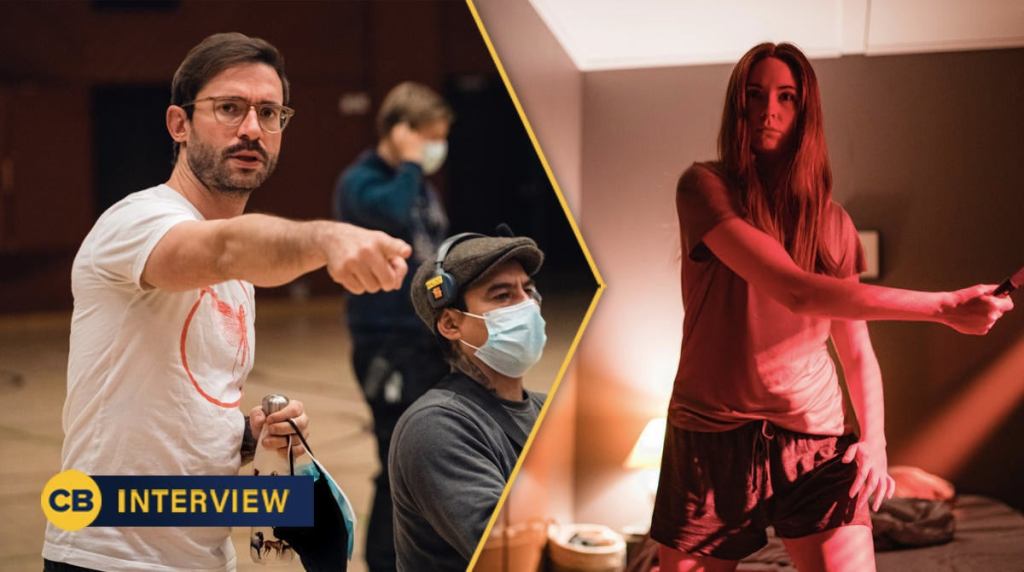
ComicBook.com: I get 30 minutes into this movie, I get 45 minutes into this movie, I get an hour into this movie, and I’m like, “When is the truck going to show up? This is a reboot of [Steven] Spielberg’s Duel. Where’s the truck?”
Riley Stearns: Where’s the truck? And it never comes. Subverting expectations.
And then I realized it’s metaphorical. Karen is the truck and she’s also the guy getting stalked by the truck.
My mom is always the first person to read my scripts, because she’s a really good proofreader. She read the script and she really liked it, but then the first thing she said was, “You know that’s not how you spell ‘duel,’ right?” And I was like, “Mom, are you kidding me? You think that I’m spelling it that way?” I’ve even spelled it the other way in the body of the script. So yeah, very funny.
The movie tackles a whole bunch of different themes. There’s so much that you can take out of it. There’s so many figurative, literal, metaphorical things that I know I took out of it, so I’m sure you did as well, but what was that first lightning bolt of inspiration? What was the first nugget of an idea to tell this story, that you then were able to start layering other themes onto?
I knew that I wanted to do a movie where an actor interacts with themselves. I wanted to have a performer opposite themselves, and so I had been trying to figure out something that could work along those lines and came up with the initial construct of the, “If you know that you’re going to die, you can have yourself cloned so that your family won’t have to miss you.” I thought that there was already something interesting there and I knew that it’s something that you’ve seen before. Now, obviously, there’s things that are very literally things that you’ve seen before, because Swan Song came out, too, since I made this, or since I wrote this, but that wasn’t enough for me. So I still was trying to figure out why it wasn’t striking enough of a match.
It wasn’t until I asked the question, “What would happen if you went into remission?” And immediately my brain said, “Well, obviously you’d have to duel to the death.” That’s when the movie became the movie and that’s where, like you said, the lightning bolt, that moment of just going like, “Oh, okay. I know what it is.” Literally the second I came up with that idea, I knew what the ending of the movie would be, and so, at that point, it all started to fall into place. And then I was able to structure it out, card everything out, and just get it to the point where I really believed in the path of it all and the reason it needed to exist as a film.
I love that, because when I was talking to [composer] Emma [Ruth Rundle] about the music earlier this week, we both resonated with that idea of killing your former self, that much bigger, headier, existential stuff, and I love that the nugget was like, “I want one person playing two people.” How it was a practical, artistic movie idea. I love that. With casting, was it immediately going to Karen? Was it tough to find somebody who you knew could play those subtleties and those nuances of two characters who are just slightly off from one another?
I actually tend to write without people in mind, because I think that unless you have somebody that says that they want to do something with you and you know for a fact they’re in, even then, you sometimes end up with a scheduling issue where they can’t do it, even though they wanted to, or their life has changed, or they had a kid, or they’re working on some other project, whatever it is. So you get into this point where — this place where you see the movie a certain way, and then you have to turn it around and make it feel like something different. I think it can do you a disservice, at least in my opinion, with my stuff. So I tend to write with blank faces in place. And then, when you go out and you start talking about casting, you start to try to find somebody who fits into that mold of what you’re looking for.
Karen was somebody who is at the same agency as me, and she was brought to our attention. I liked the idea immediately because you hadn’t really seen her in something like this, but I knew that she could do something like this. I also liked that a lot of the audience of hers isn’t traditionally going to go see a movie like this. So they’re maybe ready to go out and check out an art-house film, an indie film, that they wouldn’t have normally seen. And, by the same token, there’s a lot of audience members who are fully Dual people who have never seen a Jumanji, have never seen Karen in Guardians of the Galaxy or what have you, who now are going to say, “I really love Karen. I want to see what she’s done before and follow her career going forward.” So it was this really cool space of saying, “I think she helps us, but we also, in a weird way, help each other.” And then, Karen felt the exact same way.
And then we all know that, given that it’s Dual and it’s about that two identities thing, we all know Aaron just got the gig because it rhymes with Karen. So we can confirm that, of course. Solely, the only reason Aaron Paul is in this movie is because Aaron rhymes with Karen.
I did it to confuse myself on set, yes.
I was literally preparing to talk to you, thinking, “Oh, what was the casting of Karen and Aaron — wait a second.”
Oh, man. Two years ago, that was me.
So I’m like the two-years-behind version of you? Maybe my stubble will start to come in behind the mustache. Because your films are all so singularly you, they all feel very Riley Sterns, and they’re darkly comedic and they’re absurd, but not quite to the point of surrealism. Do you think your films all exist in the same universe?
I don’t. I think that Faults is basically in our world, only ever so slightly stylized. I feel like it’s pretty much — it takes place in our reality. And then, Self-Defense and Dual, I feel like could be universes just side by side, but I just feel like they … I like to think of every world as its own thing. I’m not a big referential person. I don’t put pop culture stuff in my movies. Dual has a song, obviously, that’s a pretty well-known song in it.
But, for the most part, I try to keep … even if they’re watching movies, they tend to watch movies that we make specifically for the film, and that’s all important for me. I think that when you get into the whole world, a universe of it all, you start to reference other universe things that you’ve already done and I don’t want to get bogged down in that. I want the movie to feel like it is its own thing and it doesn’t have to bend over to fit something in. Not that I don’t think that some people are really good at that, because there definitely are. Like, James Gunn’s really great at that sort of thing, when he wants to do it, and [Quentin] Tarantino and all that. But, for me, I like to let them exist in their own space.
I do now like to think of the idea of the Dual-world version of Full of Hell is a pop-punk band or something like that.
I like that in Self-Defense, you never even hear like … they don’t have a band name or anything. It’s just metal songs for a compilation that he made, from probably his friend’s CDs, and it’s just this random grindcore band. And then, in Dual, it’s just … That’s, like, the homage-iest I’ll ever get is putting the Full Hell shirt in Dual.
You mentioned James Gunn, and, obviously, there’s Guardians, the connection there with Karen. And now the trajectory for Marvel movies is, “Oh, let’s see what cool, indie directors have made things, and give them 400 million dollars to go nuts with Star Wars or The Mandalorian,” that type of thing. Is that huge-budget stuff at all of interest to you or do you think this is where your heart is, telling these small, intimate, left-of-center stories?
It’s not a knock against comic book or genre-y sci-fi-y things, I just feel like I didn’t grow up with that being my stuff. I feel like it would be disingenuous to just pop in and be like, “I’m going to direct a comic book movie about this character that I’ve never even heard of and all of you guys really care about it, but I don’t really care, but I’m just going to do it.” So I don’t think people want me directing those movies, but I did grow up loving Star Wars.
It’s funny you mentioned the budget of it all. I actually would love to do — I would love, even if I’m not the one doing it, I would love to do something or see something more in the space of the five-million-dollar context. Like, an indie-film version of a story that’s set in the Star Wars universe. I have an idea for a one-room Star Wars movie that Disney would never make, but it would make a lot of sense to do. Because you’ve got this small budget, you’ve got this built-in name that you can put in your parentheses or whatever, a Star Wars whatever. And I know that they tried to do their 20-million-dollar version thing. Like you’ve got … Oh, damn, what were the spinoffs again? What was the first one?
Rogue One.
Rogue One. So like you got that, and I thought it was so great and so cool that it felt like a weirder, smaller version of a movie that you would normally see as a bigger thing. They didn’t do that well, but I think it’s also because you were in that 20-million-dollar scale. I would love to see smaller, smaller versions.
Well, just strap in, prepare yourself, because we know what happened to [Martin] Scorsese when he said, “I don’t know if I like comic book movies.” Next week, it’s going to be, “Riley Stearns Not Totally Interested in a Comic Book Movie.” You’re about to be a trending topic, my friend.
I like that my version of it though is, “You guys don’t want me to do it.” Like, I’d be a bad idea.
Dual lands in theaters on April 15th.
This interview has been edited for length and clarity. You can contact Patrick Cavanaugh directly on Twitter.

